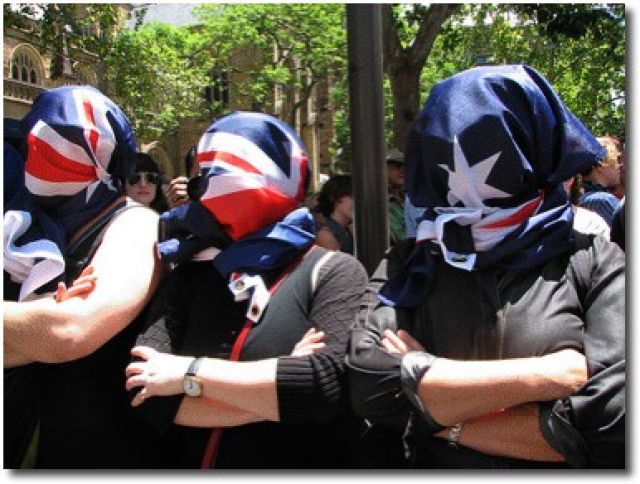
In her January 26 speech to commemorate Australia Day, Prime Minister Julia Gillard took the opportunity to celebrate what she called the “bonds of mateship”, which had been “on such strong display” in the aftermath of the recent devastating floods.
However, this year’s Australia Day celebrations were also marred by violence. This is not unusual.
Police made 180 Australia Day-related arrests throughout New South Wales on January 26.
At least some of this violence can be put down to racism. In Tea Gardens, north of Newcastle, two individuals made racial slurs to a group of young people staying in the grounds of the local Baptist church.
When confronted, the two assaulted an off-duty police officer and hospitalised the church pastor, said the February 3 Myall Coast Nota.
Violent attacks such as these are not just isolated incidents. The lion's share of racist encounters in parks, shops, trains, buses and other public spaces are never reported.
Racist individuals and groups feel more confident to express themselves on Australia Day.
The Eureka Youth League (a group linked to the racist Australia First Party) “handed out anti-immigration propaganda in various locations” on Australia Day, the January 26 Daily Telegraph said.
This racist undercurrent of Australia Day is no surprise.
January 26, 1788 is the date the first fleet landed at Sydney Cove and founded the British colony of New South Wales.
Until the late 19th century, the day was only celebrated in NSW. But it became a national celebration the context of the unification of the different Australian colonies into one nation.
A special council was established in 1936 to prepare celebrations for the 150th anniversary of the founding of the colony in 1938.
Among the measures the council took to popularise January 26 as Australia’s national day was to erase all mention of first fleet convicts from the celebrations.
The project worked. In 1946, the Commonwealth and state governments agreed to unify the celebrations at a national level. The bicentennial Australia Day celebrations in 1988 grew to attract 2.5 million people in Sydney alone.
However, it was not until 1994 that January 26 became a public holiday in all states and territories.
Australia Day celebrations tend to associate the root of Australian “attributes” and Australia’s national identity with the beginning of British settlement.
But Australia Day celebrations also obscure another key part of what began on January 26 — the dispossession and genocide of Australian Aboriginal people.
The history of white settlement of Australia is one of brutal injustice for Aboriginal people. In 1938, Aboriginal activists in Sydney organised a “Day of Mourning and Protest” on January 26 to commemorate those injustices and demand change.

In the lead up to the 1988 bicentenary celebrations, Aboriginal protesters set up a tent embassy in The Domain, Sydney. They drew attention to their ongoing struggle for Indigenous rights and criticised Australia’s national holiday, which they called Invasion Day.
January 26 is also known as Survival Day to many Aboriginal people — a recognition of dispossession, but also a celebration of ongoing survival of Aboriginal people and its many cultures.
Despite annual protest marches, Liberal and Labor politicians have repeatedly rejected calls to change the date of Australia's national celebrations.
Former prime minister Kevin Rudd responded to 2009 Australian of the Year Mick Dodson's call for a debate about moving Australia Day with "a simple, respectful, but straightforward no".
Many other dates, however, would be more relevant to the multi-cultural Australia of today.
One alternative date raised is May 27, the anniversary of the 1967 constitutional referendum.
The referendum removed clauses in the Australian constitution that prohibited Indigenous Australians from being counted in the census and allowed the federal government to pass laws relating to Indigenous people for the first time.
Another date could be December 3, which marks the anniversary of the Eureka Stockade — a miner's uprising against the colonial Victorian government that, although suppressed, later led to significant reforms. Eureka is widely held as the origin of Australian democracy.
However, some of the best dates for an Australian national celebration are yet to happen.
One is Independence Day — formally, Australia remains subject to the British monarchy.
Another is Treaty Day — the day when the Australian government finally acknowledges Aboriginal sovereignty.
If either of these events were to happen, they would be far more appropriate and representative dates to celebrate Australia’s national history than January 26.
Australia Day should be moved. The process of moving the national celebration would strike a powerful, symbolic blow against the racism that is shameful part of Australia’s history.